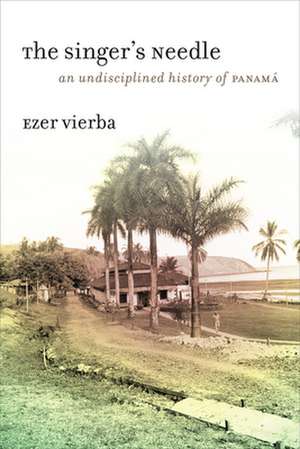The Singer's Needle: An Undisciplined History of Panamá
Autor Ezer Vierbaen Limba Engleză Hardback – 24 mai 2021
| Toate formatele și edițiile | Preț | Express |
|---|---|---|
| Paperback (1) | 256.33 lei 43-57 zile | |
| University of Chicago Press – 18 ian 2021 | 256.33 lei 43-57 zile | |
| Hardback (1) | 678.48 lei 43-57 zile | |
| University of Chicago Press – 24 mai 2021 | 678.48 lei 43-57 zile |
Preț: 678.48 lei
Preț vechi: 881.14 lei
-23% Nou
Puncte Express: 1018
Preț estimativ în valută:
129.83€ • 135.89$ • 108.06£
129.83€ • 135.89$ • 108.06£
Carte tipărită la comandă
Livrare economică 31 martie-14 aprilie
Preluare comenzi: 021 569.72.76
Specificații
ISBN-13: 9780226342313
ISBN-10: 022634231X
Pagini: 352
Ilustrații: 11 halftones
Dimensiuni: 152 x 229 x 25 mm
Greutate: 0.64 kg
Ediția:First Edition
Editura: University of Chicago Press
Colecția University of Chicago Press
ISBN-10: 022634231X
Pagini: 352
Ilustrații: 11 halftones
Dimensiuni: 152 x 229 x 25 mm
Greutate: 0.64 kg
Ediția:First Edition
Editura: University of Chicago Press
Colecția University of Chicago Press
Notă biografică
Ezer Vierba is an instructor in the writing program at Harvard University.
Cuprins
Editor’s Preface
Part I: Coiba: An Introduction to the Panamanian Subject
Chapter One: Penal Colonialism and National Sovereignty: Porras and the Liberal Reforms, 1912–1924
Chapter Two: Punishment and Subject Formation
Chapter Three: The Singer’s Report: Text and Critique in Coiba, 1920–1935
Part II: Theaters of Authority
Chapter Four: The Remonato, a Hybrid State: 1947–1955
Chapter Five: Trials of Authority: Legal Consciousness and Formal Struggles in the Postwar Era
Part III: On the Way to Chumumbito, Santa Fe
Chapter Six: Héctor’s Hermeneutics: Radical Readings and Christian Liberation in Santa Fe de Veraguas, 1968–1971
Acknowledgments
Bibliography
Part I: Coiba: An Introduction to the Panamanian Subject
Chapter One: Penal Colonialism and National Sovereignty: Porras and the Liberal Reforms, 1912–1924
Chapter Two: Punishment and Subject Formation
Chapter Three: The Singer’s Report: Text and Critique in Coiba, 1920–1935
Part II: Theaters of Authority
Chapter Four: The Remonato, a Hybrid State: 1947–1955
Chapter Five: Trials of Authority: Legal Consciousness and Formal Struggles in the Postwar Era
Part III: On the Way to Chumumbito, Santa Fe
Chapter Six: Héctor’s Hermeneutics: Radical Readings and Christian Liberation in Santa Fe de Veraguas, 1968–1971
Acknowledgments
Bibliography
Recenzii
“The Singer’s Needle is a stunning achievement: Imagine if Foucault had studied Panamá and written as clearly and compellingly as Camus. Immersing himself in the social, political, economic, and cultural history of twentieth-century Panamá, Vierba combines careful and creative archival research, sophisticated theory, and compelling storytelling. His book is an extraordinary work of history, about both what happened in the past and what it means to think and write about it today. Historians of other places and times will marvel at, and learn from, Vierba’s bold and brilliant blend of scholarship and art.”
“The Singer’s Needle is a real page-turner—in fact, it’s a path-breaker. Reading Vierba’s unusual book is like playing hopscotch as you skid between its heterogeneous elements. The skill and artistry involved in sliding the different forms of writing and different voices on top of one another, and the intimate tone achieved, is astonishingly refreshing.”
"The Singer’s Needle is required reading for anybody interested in the history of Panama and the role that places like Panama have played in the history of Latin America and the world."
"Vierba employs a palimpsest of fiction and nonfiction writing to create a 'polyphonic history.'. . . The intricate weaving of voices, theoretical debates, and archival evidence forms a dazzling experience that immerses the reader in multiple interpretations alongside historical facts without devolving into a postmodern navel-gazing or trite observations on relativism and subjectivity. . . . it is a must read for any historian working on narrative forms as method. It is also worth picking up for no other reason than being a superbly written page-turner."
